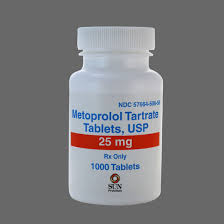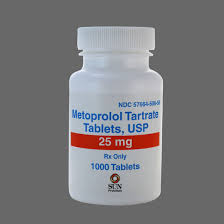Providing Quality & Trust || Clinic Website
Detailed Description
Metoprolol
(me-toe-pro-lole)
- Description: Beta-Blocker
- Other Names for this Medication: Lopressor®, Toprol XL®
- Common Dosage Forms: Veterinary: None
Metoprolol is a prescription beta blocker type medication that affects the cardiovascular system. It may be prescribed for treating certain heart conditions or disease including atrial fibrillation in dogs and hypertrophic cardiomyopathy in cats. Talk with your veterinarian before giving this medication.
- To be effective, the animal mustreceive all doses as prescribed. Can be given with or withoutfood.
- Most common side effects include tiredness/lack of energy and weakness. Low blood pressure is possible. Heartrate can slow too much and worsen heart problems if dose is too high. Notify veterinarian if animal becomes exercise intolerant, has shortness of breath or cough, or develops a change in behavior or attitude.
- When starting this drug, your veterinarian may start with a low dose and gradually increase it over time to see how your animal reacts to it. Do not administer more drug than your veterinarian has prescribed.
- Very important notto stop the drug abruptly without veterinarian’s guidance.
How is this medication useful?
Metoprolol is a beta blocker that veterinarians prescribe for treatmentfor certain heartrhythm problems, hypertension, or for hypertrophic cardiomyopathy in cats. The FDA (U.S. Food & Drug Administration) has approved this drug for use in humans butitis not officially approved for use in animals in the USA. The FDA allows veterinarians to prescribe products containing this drug in different species or for other conditions in certain situations. You and your veterinarian can discuss why this drug is the most appropriate choice.
What should I tell my veterinarian to see if this medication can be safely given?
Many things might affect how well this drug will work in your animal. Be sure to discuss the following with your veterinarian so together you can make the besttreatment decisions.
- Other drugs can cause problems when taken with metoprolol. Be sure to tell your veterinarian and pharmacist what medications (including vitamins, supplements, or herbal therapies) you are giving your animal, as well as the amount and schedule of each.
- Tell your veterinarian about any conditions or diseases your animal may have now or has had in the past.
- If your animal has been treated for the same disease or condition in the past, tell your veterinarian aboutthe treatment and how well it did or didn’t work.
- If your animal is pregnant or nursing, talk to your veterinarian aboutthe risks of using this drug.
- Tell your veterinarian and pharmacist about any medication side effects (including allergic reactions, lack of appetite, diarrhea, itching, hair loss) your animal has developed in the past
Uses/Indications:
Because metoprolol is relatively safe to use in animals with bronchospastic disease, it is often chosen over propranolol. It may be effective in supraventricular tachyarrhythmias, premature ventricular contractions (PVCs), systemic hypertension, and treating cats with hypertrophic cardiomyopathy.
There is no consensus for use of beta-blockers in dogs with non-congestive heart failure. One retrospective study showed increased survival times when dogs were given metoprolol, but definitive prospective, double-blinded studies have not been reported documenting the benefit (increased survival) of beta-blockers in dogs with heart failure. In the American College of Veterinary Internal Medicine (ACVIM) Consensus Panel Guidelines for the Diagnosis and Treatment of Canine Chronic Valvular Heart Disease, the panel recommends that if beta-blocker therapy is to be instituted in Class C2 (dogs with either clinical signs mild enough to allow home therapy or dogs previously stabilized during hospitalization for acute CHF) myxomatous mitral valve disease (MMVD), their use should be limited to dogs that have been stabilized and the dosage gradually increased with careful monitoring. Dogs in this class with atrial fibrillation are another reason to consider beta-blockers to help control heart rate.
Available:
- 25 mg tablets
- 100 count
What are the side effects ofthis medication?
Side effects that usually are not serious include:
- Lack of energy or acting tired atthe beginning of treatment.
- Diarrhea (in dogs).
You don’t have to be overly concerned if you see any of these signs unless they are severe, worsen, or continue to be a problem. Contact your veterinarian if this happens.
Side effects that may be serious orindicate a serious problem:
- Very slow heartrate, collapse (passing out), weakness, or coughing, wheezing, or trouble breathing.
These signs do not occur commonly and usually mean the dose is too high for your animal. If you see any of these signs, contact your veterinarian immediately.
Read and follow the prescription label carefully for storage information, possible side effects, and drug interactions.
Give the exact amount prescribed and only as often as directed.
Do not skip doses or stop giving the medication without consulting your veterinarian.
Important Information:
Metoprolol is contraindicated in patients with overt or unstable heart failure, hypersensitivity to this class of agents, greater than 1st-degree heart block, or sinus bradycardia. The ACVIM Consensus Panel unanimously advised against the using beta-adrenergic blockers in dogs with active CHF. Non-specific beta-blockers are also relatively contraindicated in patients with bronchospastic lung disease.
Metoprolol should be used cautiously in patients with significant hepatic insufficiency or sinus node dysfunction.
Metoprolol (at high dosages) can mask the clinical signs associated with hypoglycemia. It can also cause hypoglycemia or hyperglycemia and, therefore, should be used cautiously in labile diabetic patients.
Metoprolol can mask the clinical signs associated with thyrotoxicosis, but it may be used clinically to treat the clinical signs associated with this condition.
Do not confuse metoprolol succinate with metoprolol tartrate.
Powered by nopCommerce
This site is running in live payment mode. Real payments will be processed.

